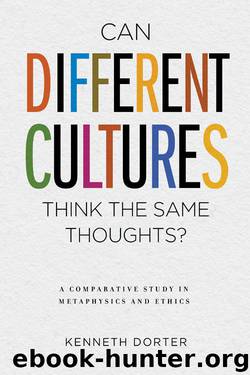Can Different Cultures Think the Same Thoughts? by Kenneth Dorter

Author:Kenneth Dorter
Language: eng
Format: epub
Publisher: U of Notre Dame
Published: 2018-01-12T00:00:00+00:00
Confucius and Socrates
In several ways Confucius and Socrates have much in common. Both founded the dominant intellectual traditions of their culture, both achieved their influence by teaching rather than writing, both thought the key to virtue was knowledge, both attempted to put their ideas into practice by entering political life, and both were unsuccessful because of their inability to overcome corruption within their societies. But these resemblances are merely formal, and when we turn to the content of their thought, at first glance Confucius and Socrates seem to represent opposite extremes. One was a proponent of rigorous social conventions to be obeyed without question for whom propriety and loyalty were cardinal virtues. The other was an iconoclast who devoted his life to confronting conventional values and unexamined obedience, challenging them with natural value and independence of mind, for whom courage was a cardinal virtue and loyalty was not, and who was condemned to death for his disrespect of tradition. Confucius, however, was living in a feudal monarchy and Socrates in an obstreperous democracy. Here again we see the influence of culture on thinking, but many if not all of the differences may be regarded as reflecting a difference of emphasis rather than a difference of values. Confucius may not have been a gadfly in Socrates’s sense (Apology 30a), but for all his espousal of learning traditions rather than challenging them, his disciples were told by an official that “Heaven shall use the master as a wooden bell” (Analects 3.24), a metaphor not unlike that of the gadfly, since the function of such a bell was to rouse or awaken the people.1 And for all his insistence on the conventions of propriety, he said, “If a man is not humane, what has he to do with propriety?” (3.3). On the other side Socrates, for all his iconoclasm and defiance, argues strenuously in the Crito, Republic, and Laws in favor of respecting and obeying the law.
It is hardly surprising that Confucius and Socrates cannot really represent opposite extremes, because each of them saw goodness as a mean,2 rather than as something to be achieved by extreme measures. Both saw the mean as the key to successful government. Speaking of the two legendary sage-kings that he took as a model, Confucius relates that Yao told Shun, “Faithfully adhere to the mean and thy rule shall extend to the Four Seas’ ends; heaven’s blessings shall last throughout thy reign” (20.1). And in Plato’s Laws the Athenian says,
If one gives a greater degree of power to what is lesser, neglecting the mean . . . then everything is upset. . . . There does not exist, my friends, a mortal soul whose nature will ever be able to wield the greatest human ruling power when young and irresponsible, without becoming filled in its mind with the greatest disease, unreason, which makes it become hated by its closest friends. When this comes about it quickly destroys it and obliterates all its power. Guarding against this, then, by knowing the mean, is the task of great lawgivers.
Download
This site does not store any files on its server. We only index and link to content provided by other sites. Please contact the content providers to delete copyright contents if any and email us, we'll remove relevant links or contents immediately.
| Anthropology | Archaeology |
| Philosophy | Politics & Government |
| Social Sciences | Sociology |
| Women's Studies |
The Bloomsbury Encyclopedia of Philosophers in America From 1600 to the Present by Shook John R(1203)
The Swerve by Greenblatt Stephen(1153)
Friedrich Nietzsche by Curtis Cate(1017)
History Of Western Philosophy by Bertrand Russell(902)
Mere Christianity by Lewis C. S(804)
The Swerve: How the World Became Modern by Stephen Greenblatt(802)
The Birth of Tragedy by Friedrich Nietzsche(760)
Beyond Fate by Margaret Visser(642)
The Great Divorce by C. S. Lewis(601)
The Forbidden Universe: The Origins of Science and the Search for the Mind of God by Lynn Picknett & Clive Prince(582)
The Age of Wonder: The Romantic Generation and the Discovery of the Beauty and Terror of Science by Richard Holmes(580)
El Mundo de Sofía by Jostein Gaarder(565)
God and the Atom by Victor J. Stenger(499)
Freedom's Right by Axel Honneth(486)
A Discourse on Inequality by Jean-Jacques Rousseau Maurice Cranston (translator)(464)
How to Think About the Great Ideas by Mortimer J. Adler(461)
Leviathan by THOMAS HOBBES & MICHAEL OAKESHOTT & RICHARD S. PETERS(454)
Existentialism and Excess: The Life and Times of Jean-Paul Sartre by Gary Cox(438)
The Hedgehog and the Fox by Ignatieff Michael Hardy Henry Berlin Isaiah(425)
